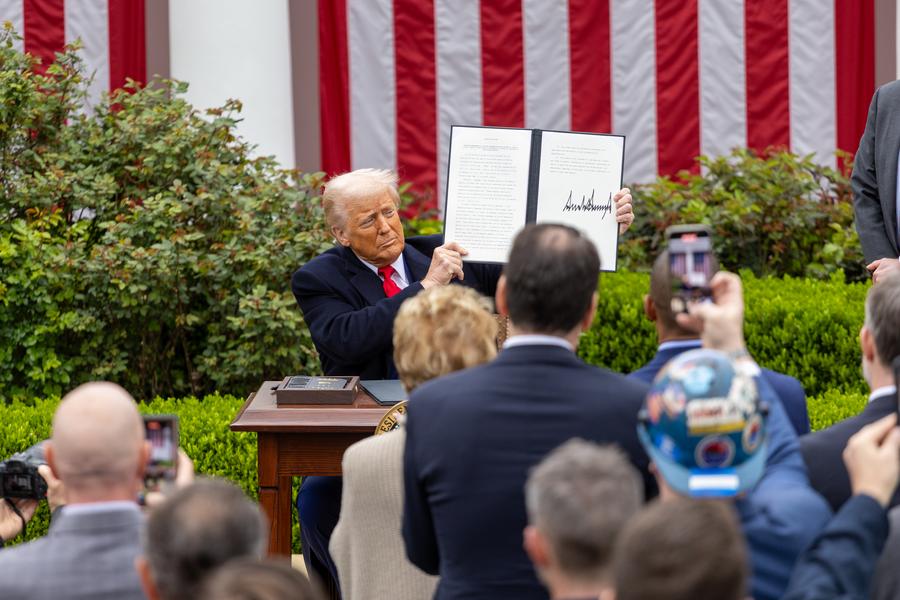
U.S. President Donald Trump shows an executive order on "reciprocal tariffs" at the Rose Garden of the White House in Washington, D.C., the United States, on April 2, 2025. (Xinhua/Hu Yousong)
As the U.S. administration under Donald Trump is scrambling to remodel global free trade into a zero-sum game, it would do well to recall a consistent truth: trade wars produce no winners.
BEIJING, April 9 (Xinhua) -- Washington has once again reverted to its coercive playbook of issuing ultimatums, escalating trade tensions on Monday by demanding that China abandon its legitimate countermeasures or face a new round of tariff hikes.
The timing of this latest threat -- just days ahead of a new wave of country-specific "reciprocal" tariffs on dozens of its trading partners on Wednesday -- reeks of desperation.
If Washington believes that ramping up pressure can compel Beijing to give in, it is engaging in wishful thinking. China has been firm in its stance, refusing to bow down to Washington's ultimatum, vowing to respond in kind, and fighting to the end.
As the U.S. administration under Donald Trump is scrambling to remodel global free trade into a zero-sum game, it would do well to recall a consistent truth: trade wars produce no winners. The United States is far from immune to the economic wounds of the trade war it has ignited. American markets are already feeling the strain, businesses face growing uncertainties, and the risk of recession is ballooning.
During Trump's first term, his trade war inflicted significant damage on the U.S. economy -- leading to higher consumer prices, financial strains on American farmers, and manufacturing slowdowns as companies struggled with the rising costs of imported materials.
"The trade war has not to date provided economic help to the U.S. heartland: import tariffs on foreign goods neither raised nor lowered U.S. employment in newly-protected sectors; retaliatory tariffs had clear negative employment impacts, primarily in agriculture," said a recent research from the U.S. National Bureau of Economic Research.
Given the broader scale of Washington's latest trade war, the consequences are likely to be much worse. Tariffs will not protect U.S. industries; instead, they will inflate costs for manufacturers, disrupt global supply chains and burden consumers already grappling with inflation.
Washington's decision to escalate tariffs on China and other trading partners is a grave mistake that needs to be corrected.
In an interconnected global economy, resorting to protectionism is not a sign of strength -- but shortsightedness and arrogance. If Washington is truly committed to building a better future, it must move away from the illusion of unilateral control and return to the principles of respect, equality and cooperation. Anything less risks accelerating the United States' economic decline.
编辑:呼乐乐